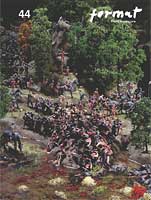Mizologiczne myślenie o zagładzie
The Mysological Thinking on the Holocaust
Author(s): Kazimierz PiotrowskiSubject(s): Christian Theology and Religion
Published by: Akademia Sztuk Pięknych im. Eugeniusza Gepperta we Wrocławiu
Keywords: the history of the Jewish Holocaust; the extermination of the Armenian people; Mickiewicz; the memory of the Holocaust as the element of culture
Summary/Abstract: In one of his letters, young Mickiewicz wrote on the influence of religion on our thinking, and on our behaviour. The poet liked heterodoxy. He suggested that we should avoid drastic interpretation of religious law, and its practical, political implementation. There are many elements of mysophylia and mysology in our own thinking about the Holocaust. We should think in the terms of heterodoxy. We should follow the religion of joy, and not constant suffering and sadness. We should be able to experiment with irreligious elements in culture. We need good and beautiful God. Of course, the memory of extermination brings us closer to God. The Holocaust art is connected with the Holocaust religion. The history of the Jewish Holocaust can be connected with the extermination of the Armenian people, and current events in the Balkan countries. Our thinking about the Holocaust may contribute to starting a new religion, which might spread across the continents. It would contribute,too, to the integration of the mankind. Nevertheless, there are serious dangers connected with such ideas. The most important is the danger of ‘pedantic revenge’, which Mickiewicz described in his letter. Also, such religion would have to disregard its Judaic rots in order to become acceptable by different people on different continents. Zbigniew Libera refers to mysogenic thinking about the Holocaust. He believes that the religion of the Holocaust is connected with popular artistic forms. His “Christ is my Life”, and “Lego – the Extermination Camp” (1996) illustrate his attitude towards the subject. He suggests that the Jews are a collective Messiah of the 20th century. His “Dwellers” (2002) suggest that we all are the victims of the Holocaust. We shouldn’t, though, be constantly reminded of the nighmares of the 20th century. Libera believes that we should become ‘less religious’ when we think about the religion of the Holocaust. Also, we should be less ‘pedantic’ when we think about different nightmares. There are many people who believe that we shouldn’t forget about the Holocaust. Frank Ankersmit wrote that the memory of the Holocaust should be considered as the element of culture. He believes that people shouldn’t stop suffering from that trauma, which, in fact, is a sort of civilisation sickness. Libera and other artists don’t agree with Ankersmit. They suggest that people should be able to enjoy mental health and they should be able to enjoy peace, both in the reality and in their own hearts.
Journal: Format - Pismo artystyczne
- Issue Year: 44/2004
- Issue No: 01+02
- Page Range: 5-6
- Page Count: 2
- Language: Polish

